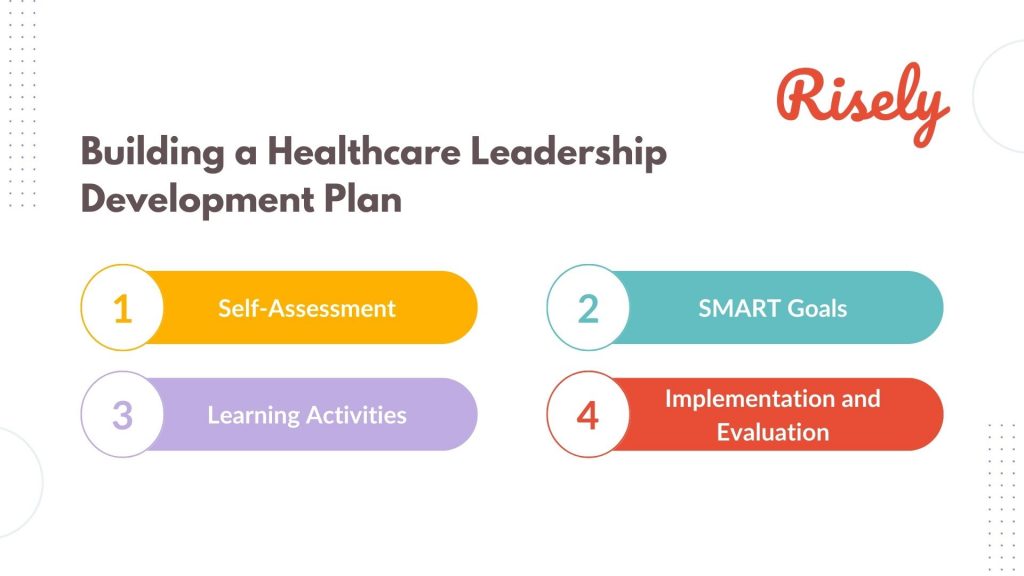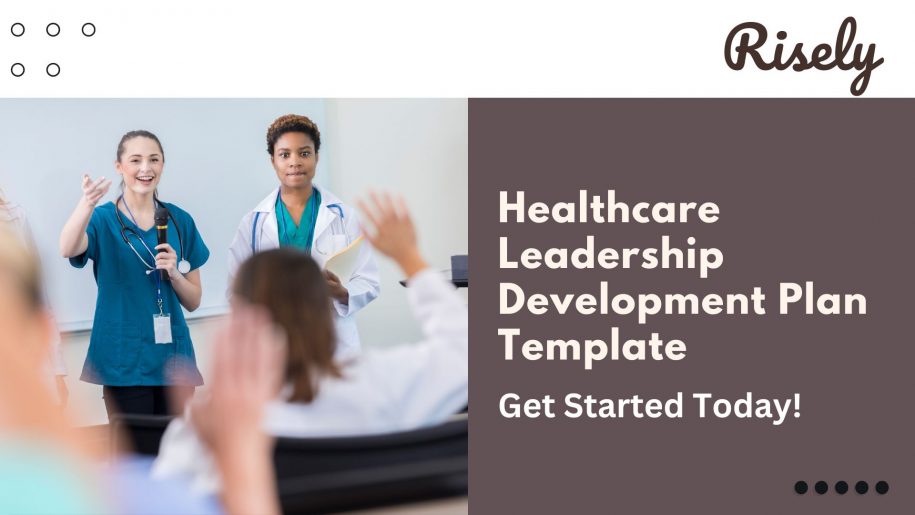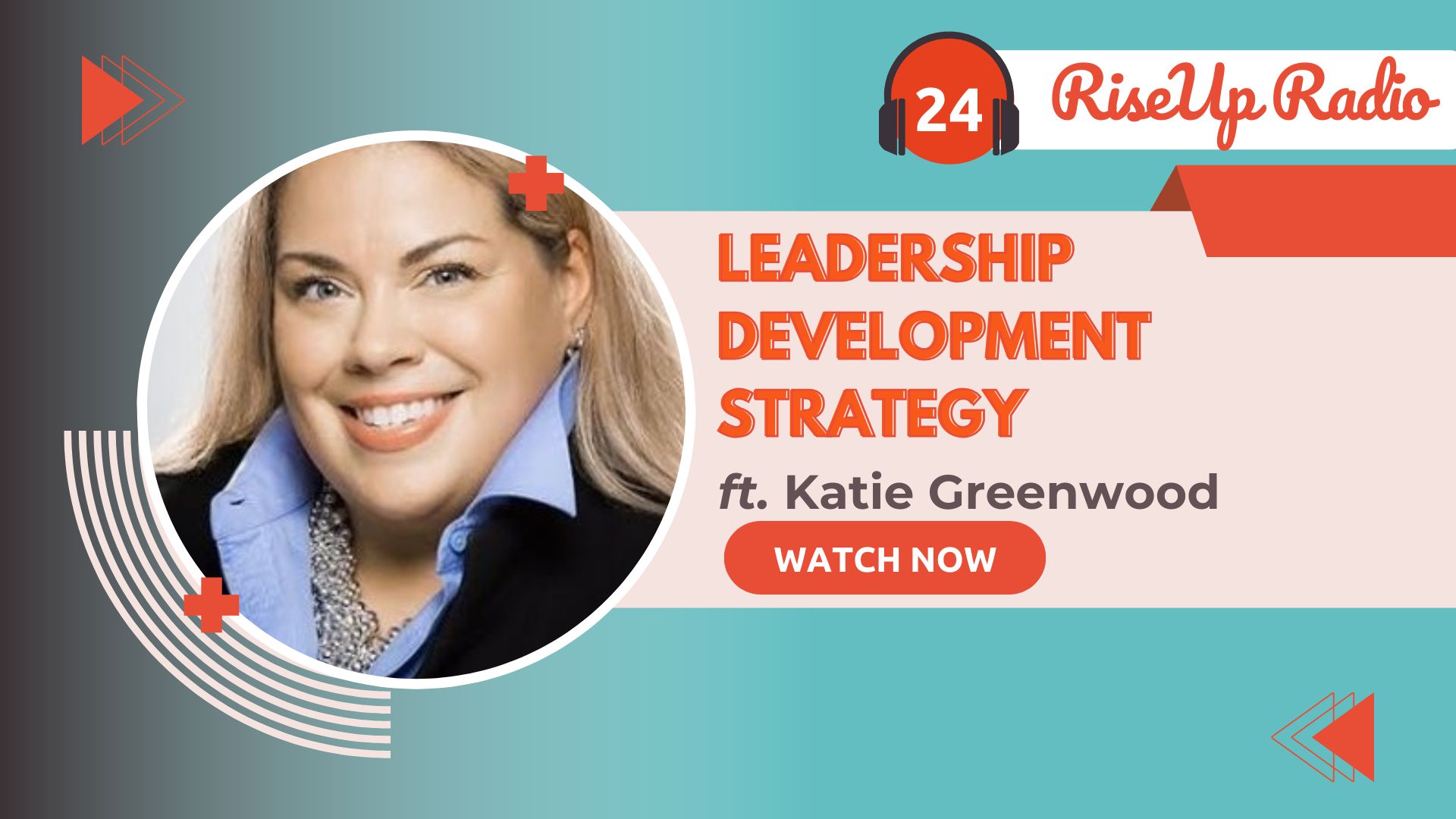Healthcare Leadership Development Plan Template: Get Started Today!
Imagine you walk into a hospital and are greeted by a team of healthcare professionals working seamlessly together. They’re confident, compassionate, and passionate about providing the best care. This efficient and supportive environment thrives under the guidance of strong healthcare leaders. But the reality is that finding and retaining such leaders is a growing challenge. Many healthcare executives plan to retire within the next five to ten years. This leadership gap and the ever-evolving healthcare landscape demand innovative solutions. This is where healthcare leadership development plans come into play. As a healthcare professional, these personalized roadmaps empower you to hone your leadership skills, navigate complex situations, and build a thriving healthcare leadership development ecosystem. Whether you’re a seasoned leader seeking to refine your expertise or an aspiring leader ready to take on new challenges, this blog will equip you with the knowledge and tools to chart your healthcare leadership development journey.Table of Contents
Challenges Faced by Healthcare Leaders Today
The healthcare sector is in constant flux, presenting unique challenges for leaders in the industry. From navigating the intricacies of evolving regulations to the rapid technological advancements, these individuals face a complex and demanding environment. Let’s delve into some of the key challenges that healthcare leadership development encounter:- Ever-Changing Regulatory Landscape: Keeping pace with shifting regulations and compliance requirements from various governing bodies can be daunting. Leaders must be adaptable and agile to ensure their organizations operate within the legal framework while delivering quality care.
- Embracing Technological Advancements: The healthcare industry is witnessing rapid technological integration, from electronic health records (EHRs) to artificial intelligence (AI). Leaders need to champion innovation while ensuring these technologies’ ethical and effective integration to improve patient care, workflow efficiency, and data management.
- Balancing Financial Pressures and Quality Care: Healthcare leaders face the constant tug-of-war between financial sustainability and maintaining high-quality patient care. Optimizing costs while ensuring essential resources and services are readily available requires strategic planning, resource allocation expertise, and cost-effective decision-making.
- Managing a Diverse and Evolving Workforce: Healthcare organizations have diverse demographics, cultural backgrounds, and skill sets. Leaders must foster an inclusive and supportive work environment that promotes collaboration, communication, and professional development to retain and engage this valuable workforce.
- Navigating Shifting Patient Expectations: Patient expectations regarding healthcare delivery are constantly evolving. Leaders need to be responsive to these changing needs, focusing on patient-centered care, transparency, and accessibility. This includes establishing open communication channels, offering diverse care models, and prioritizing patient satisfaction.
Essential Skills for Healthcare Leadership Development
Healthcare leaders require specialized skills to navigate the complexities of their roles and drive their organizations toward success. Here’s a breakdown of some key areas where learning and development (L&D) initiatives can significantly benefit them: 1. Strategic Planning and Vision:- Understanding long-term goals: Healthcare leaders must develop strong strategic planning skills to align their mission with the changing landscape. L&D can provide training in analyzing trends, assessing risks, and developing roadmaps for future sustainability and growth.
- Big-picture thinking: Leaders must be able to see the bigger picture and articulate a compelling vision for their organization. This includes setting clear goals, communicating the vision to their teams, and inspiring buy-in.
- Clarity and transparency: Open, honest, and timely communication is essential for building trust within healthcare teams. L&D can address skills like effectively leading meetings, tailoring communication to different audiences, and fostering feedback mechanisms.
- Conflict resolution and negotiation: Healthcare leaders often need to mediate, resolve, and negotiate with various stakeholders. L&D can help them build expertise in active listening, collaborative problem-solving, and win-win negotiation techniques.
- Adapting to evolving needs: Healthcare organizations must constantly adapt to new regulations, technological advancements, and patient needs. L&D initiatives can focus on developing the agility and resilience required to manage change initiatives effectively.
- Overcoming resistance: Leaders should be able to anticipate and address resistance to change, communicate new strategies clearly, and involve stakeholders in the process.
- Self-awareness and self-regulation: Recognizing and managing their emotions in stressful situations is crucial for healthcare leadership development. L&D can offer resources and training to help them build this self-awareness.
- Empathy: Understanding the perspectives of patients, staff, and stakeholders is vital. L&D can foster empathy-building exercises and promote effective communication strategies.
- Motivation and team-building: Healthcare leaders need to inspire and motivate their teams, fostering a sense of shared purpose and collaboration.
- Data-driven decision-making: Interpreting health data and utilizing analytics for better decision-making is a valuable skill for leaders.
- Financial management: Strong fiscal management and budgeting skills are essential for resource allocation and optimizing operations.
- Legal and ethical awareness: Staying updated on healthcare regulations, compliance standards, and ethical guidelines is crucial to avoid risks.
Other Interesting Reads

Building a Healthcare Leadership Development Plan
Ready to take your healthcare leadership development journey to the next level? The first step is crafting a personalized development plan that identifies your strengths and targets areas for improvement. It equips you with the necessary skills to navigate the challenging and rewarding world of healthcare leadership.Step 1: Self-Assessment
Think of self-assessment as your roadmap. By reflecting on your strengths and weaknesses, you can identify areas where you truly excel and pinpoint areas where you can further develop your leadership skills. Here are some tools to help you on your self-discovery journey:- Self-reflection exercises: Dedicate time to journaling, meditating, or simply thinking critically about your leadership style, communication skills, decision-making process, and areas where you feel challenged.
- 360-degree feedback: Seek feedback from colleagues, supervisors, and patients to gain a well-rounded perspective on your leadership strengths and weaknesses.
Step 2: SMART Goals
Now that you understand your strengths and weaknesses, it’s time to define SMART goals, the guiding lights for your leadership development journey. SMART goals are Specific, Measurable, Achievable, Relevant, and Time-bound. Here are some examples of SMART goals in a healthcare leadership context:- Specific: “Improve communication skills to build stronger relationships with team members.”
- Measurable: “Increase active listening time during team meetings by 20% within the next three months.”
- Achievable: “Participate in a communication skills workshop offered by the hospital within the next month.”
- Relevant: “Developing stronger relationships with my team will foster trust, collaboration, and improved patient care.”
- Time-bound: “Achieve these goals within the next six months.”
Step 3: Learning Activities
The next step is choosing suitable learning activities to help you achieve your SMART goals. Here’s a diverse learning landscape to explore:- Formal Training: Workshops, seminars, and leadership development programs specifically designed for healthcare professionals can equip you with essential skills and knowledge.
- Experiential Learning: Mentorship programs with experienced leaders, job shadowing opportunities, and project assignments can provide valuable first-hand experience and practical insights.
- Informal Learning: Industry publications, online resources, and self-directed learning through online courses or podcasts can offer continuous learning opportunities at your own pace.
Step 4: Implementation and Evaluation
Remember, a development plan is only as good as its implementation and evaluation. Here’s how to ensure you stay on track and celebrate your successes:- Create a timeline: Set realistic timelines for completing each learning activity and achieving your SMART goals. This will keep you focused and motivated.
- Track your progress: Regularly assess your progress towards your goals. This can involve journaling, keeping track of completed learning activities, or simply reflecting on your personal growth.
- Seek feedback: Don’t be afraid to seek feedback from colleagues, mentors, or supervisors throughout your development journey. Their insights can help you stay on track and identify areas for further improvement.
- Celebrate your wins: Recognizing and celebrating your achievements, no matter how small will boost your motivation and sense of accomplishment.
Conclusion
In conclusion, navigating the complex world of healthcare leadership requires a commitment to continuous learning and development. By assessing your strengths and weaknesses, setting SMART goals, and choosing diverse learning activities, you can create a personalized development plan that empowers you to lead confidently and positively impact your organization. Remember, leadership excellence is not a destination but a continuous journey of learning and growth. Embrace this journey, and empower yourself to become the leader your healthcare organization and patients deserve.Ready to elevate your supervisory skills and lead with confidence?
Other Related Blogs
Building an Ultimate Leadership Development Action Plan
How to Build a Leadership Development Action Plan? Having a strong Leadership Development Action Plan is more critical than ever in today’s evolving business world. Whether you’re looking to drive…
Leadership Journey Examples on the RiseUp Radio Podcast
Leadership Journey Examples on the RiseUp Radio Podcast Leadership isn’t a destination – it’s a journey filled with twists, turns, and transformative moments that shape not just careers, but entire…
What is Immersive Learning? A New Era in Education
In this blog, you’ll learn what is immersive learning and how it is changing training, increasing engagement, and influencing the future of workforce development. … Read More
What are Learning Designs? All You Need To Know
This blog explains what learning designs are in depth while also covering it’s key components. It tells you about the process involved in creating a good learning design along with…


